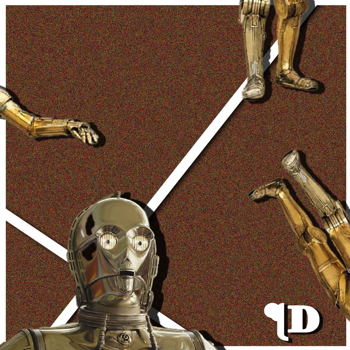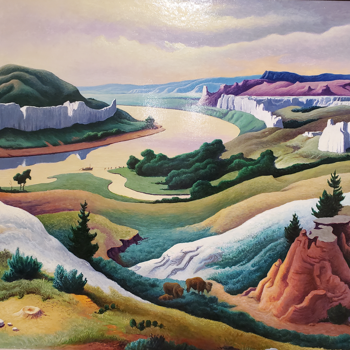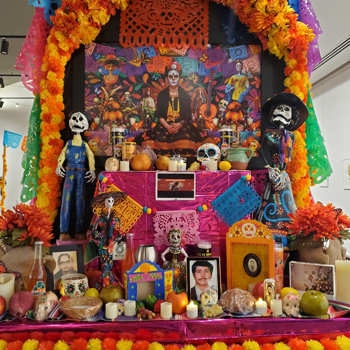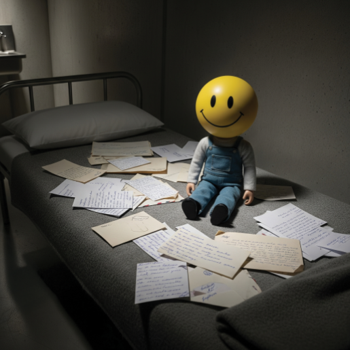Moments of Fluidity
 Artwork by DALL·E
Artwork by DALL·E
There are always leaks. Sometimes during the early morning, Patrice’s skin seeps through every pore, even before Jacques has buried himself in the shadows of his studio. These times, she strips quickly and locks herself in the bathroom so that Anise won’t notice.Patrice lies in the warm tub, very still watching until the water stops rising. It usually doesn’t take long to cease; she thinks it might have something to do with osmotic pressure. By now she’s usually able to tell when she is about to precipitate.
Patrice’s moments of fluidity are no ordinary perspiration. She does not carry the stale scent of secreted toxins or the saltiness of her body’s cooling system. She decides it has the sweet licorice tang of chilled Sambuca. She can’t remember when she was without its strange pellucid glow that reminds her of soft eggshells. All she knows is that it begins with a gentle pressure against her skin like an inkling of a thought; a pooling of inspiration, until it flows steadily and assembles into thoughts, words. A new rhythm. Her own water meter.
There are still times when it comes upon her suddenly, though these are rare. Sometimes it’s the rain that draws her. Usually, the effect is localized; perhaps the palm of her left hand, the back of her neck, her calves, or underlip. Patrice doesn’t mind her fluid body. Its tides are soothing. Even though her clothes sometimes become soaked before she can peel them from her oozing skin, she has managed to hide it from Anise, whose eyes are mostly filled with the dark shadows that obscure her once-vibrant palate and canvases.
Many times Patrice has thought of simply telling Anise, of letting her see. She aches to end the secrecy, but she always checks herself and decides to wait for another moment, another flow, or perhaps when he is painting in color again. But then she becomes afraid her lover will find it repulsive, that she will not understand, or that she’ll continue to paint only the blackness of things. Patrice is afraid of where Anise’s darkness comes from and why she can no longer see beyond it. She doesn’t know how to ask.
Once she had drifted around the subject of fluidity with Rene, desperately wanting to ask if her brother had ever experienced such liquid profusions. Rene had laughed at such madness and advised his younger sibling to release such imaginings in her poetry, as it was probably therapeutic. Yet for Patrice, poetry is not therapy. Her writing does not ease her tortured body as resolutely as her weeping skin does, instead, it wrenches her almost to breaking point as she chips words out painstakingly, to reveal smooth sounds. She knows the two are connected, but not which came first. Sometimes she sculpts Anise into a poem and leaves it in her studio, where it remains un-read until it is too smothered in paint splashes to be legible anyway.
Rene has given up telling his sister to leave Anise. Patrice sighs at her brother’s rolling eyes and purses her lips because Rene is unable to see the brilliance that arcs at the edges of Anise’s bleak art. But how could Rene understand? He hasn’t lived in Anise’s palette for six years as Patrice has. Sometimes Patrice feels she hasn’t really either and sometimes that is a good thing. And six is such a smooth, rounded number, so close to sex and fix. These are silent words she and Anise have pressed between them, in shades of gray and shifting purple-black. When Patrice spills out her sadness for the want of color in Anise’s life and when the ink runs off the page, she is silent and waits for a change to come. Waiting.
Patrice thinks there is something beautifully ambiguous about the atonality of the written word, and something exquisitely painful about the silence of darkness.
As she dabs her damp cheeks with a cold towel and prepares to send out some more poems to her publisher, Patrice hesitates for a moment, takes them from the envelope, and wonders, wonders if she should send them after all. Anise would shrug and ask why not? They are, after all, orphans, fostered before moving on to other temporary dwellings. She knows she should not hold herself responsible for their outcomes. Though Anise has long since stopped painting in color, her language was still bright for a while. Then came the silence, when she gave in to the multiple nuances of shadow.
Within Anise’s world of chiaroscuro, Patrice wondered if she too has become dull. That was when she started to write. At first, it was to share her feelings or to coax her lover. Gradually it became her own form of art; a stark contrast to Anise’s bruised canvas- her blue words biting into the crisp page. Now they struggle to find words for each other. Patrice never questions Anise’s darkness and she never questions her bathroom hours. It is as though there is no need for questions between the bone etchings of poetry and visceral dissection of the canvas, each has their own way of turning the inside outwards.
So Patrice sends the poems anyway and takes her pen and notebook to the studio and sits, as she does sometimes, on the high stool at the edge of the naked lamplight and watches Anise paint, staring until her eyes are begging for a trace of orange or a tint of green. She scatters words over her notepad. Anise either does not notice she is there or does not care. While thinking this over, the pen almost slips silently from Patrice’s hand, which has started to seep and drip down into her sleeve.
For a moment she enjoys the moist warmth then she remembers the studio, Anise, and safety of the bathroom. Patrice makes up her mind. Six is a nice round number that can curve them together into swimming fish. She waits, sitting there on the high stool, once reserved for models. Anise still does not see her. A glimpse at her foaming palette tells Patrice she is painting another dark ocean.
Patrice breathes deeply and releases the tension from every cell of her body, no longer restraining her flow. Before long, her clothes are darkened and rivulets of water pool on the floor at her feet, emitting a pale, eggshell-blue light. Anise’s brush is silent, and Patrice hears the ocean roar between them. Anise steps outside of her canvas. Patrice’s water is flowing almost to where her lover stands. Her cheeks are flushed, and her sandy hair darkened against her skin. She glistens with pellucid light. Anise’s eyes widen to take her all in. She is entranced, and then suddenly she splashes towards Patrice. She dips a delicate brush into the cup of Patrice’s palm and studies it. Then she sets up a blank canvas and begins a new painting. Between the palette and the canvas, she dips her brush into the crook of Patrice’s arm, the nape of her neck, and mixes her tides into her oceanic waves. Now Patrice can see the tints of green and orange splashing through them.
Anise swims about the canvas heaving spray across its skin. Patrice watches her, laughing, not noticing her notebook, still on her lap, where her fingers seep through the pages and words bob, and dance in the surf.
When eventually she looks away from Anise’s colors, Patrice sees her lover is smiling at her. She glances at her notebook where her words have shifted, and the tide has cast up a new poem.





